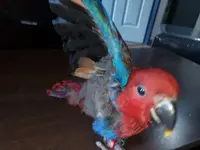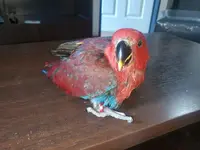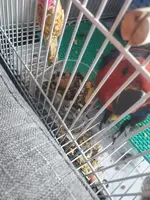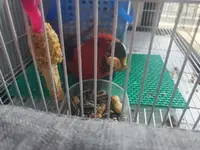Hello everyone
I have bought eclectus 2.5 months old few days ago
She seems not hand fed before she was mom rising
My issues that she doesn't like to eat from my hand by spoon or syringe
The breeder use a small tube on the syringe to feed her should I keep use it ?
When I put her in her nest where she sleep , she start bites me if I try to take her out
Can any one help me with her behavior and what should I do with feeding issue
Welcome and........... big wing hugs to the two of you.
Hope you are close to your breader as I hope she won't get too much stress from traveling. She is a fragile little one.
Naturally,she is afraid of everything new. She doesn't know that she is safe and loved so much yet. So let's give her time to adjust, keep every introduction of new things at her pace.
You might find this useful. It's a table that approximate birds age and weaning.
Bird Weaning

www.kaytee.com
However each bird is different and there is no harm in taking it slower than normal. This is not a race.
So in sum, you have.....
...an unweaned baby, (don't eat solid food)
....fed by mother bird
....afraid of hands
....bite
I can only imagine your dilemma. You probably would be equally worried about returning this baby or raising her. So before you decide what to do. Let's talk about how to keep her nourished.
The feeding tube attach to the syringe, is used by some because.......
it would put the food straight down to her stomach. It's convenient for the breader. However, if the food is too hot, the baby crop will burn and so will be dangerous/need to be cared for by the Vet. Another thing is, the baby would still know little about swallowing if she was fed this way. I don't agree with using the tube. What is so hurry.
In your case, the baby was fed by the mother. So she already knows how to swallow food. She is also very small, so she will be hungry frequently. Possibly as frequent as every 3hours. That is 3 to 4 feeding times a day. With a stop to empty her crop 8to10hours at night.
Now to use the syringe, the baby will learn to swallow food with the rhythm of the feeder. Slow hand control of the syringe give her small amount to swallow at a time. The feeding must always be from the side to prevent aspiration. Food down her respiratory track could be fatal. Margin for error HERE is very thin.
Curious about hand-feeding baby birds? There are several considerations to make when hand feeding. Visit vcahospitals.com for expert advice.

vcahospitals.com
"How do I know if something is wrong?"
If you suspect something is wrong with your bird, you should immediately contact your veterinarian. Signs to watch for include:
- Chirping or crying all the time
- Fussing a lot and not sleeping
- Listless, droopy wings or head
- Not accepting food
- Lack of feeding response
- Slow or lack of crop emptying
- Poor weight gain
- Slow growth
- Abnormal posturing or abnormal wing and/or leg positions
- Abnormal or lack of droppings
- Wetness or food on skin over the crop (indicating a possible burn)
I can only imagine your dilemma. You probably would be equally worried about returning this baby or raising her or rushing her to an Avian Vet.
You have mentioned she doesn't like to eat from .....hand, spoon, syringe.....is she afraid of new equipment....? Or is she sick?
Some baby can get sick from traveling.
How much did she eat? The Vet will weight her and calculate the amount of food she would normally eat. For instance, a baby weight of 150g should eat at least 15cc. Per meal. If she eat less, she may not be able to eat because she's sick. And then her dropping should be consistent with her eating, anything less, she may have a sour crop. Every thing treatable but easier to treat if taken to the Vet ASAP.
Is she eating many syringes in each meal,
how is her dropping?
Amount of her eating on the first day compare to 2nd and 3rd day?
Do keep up post...






